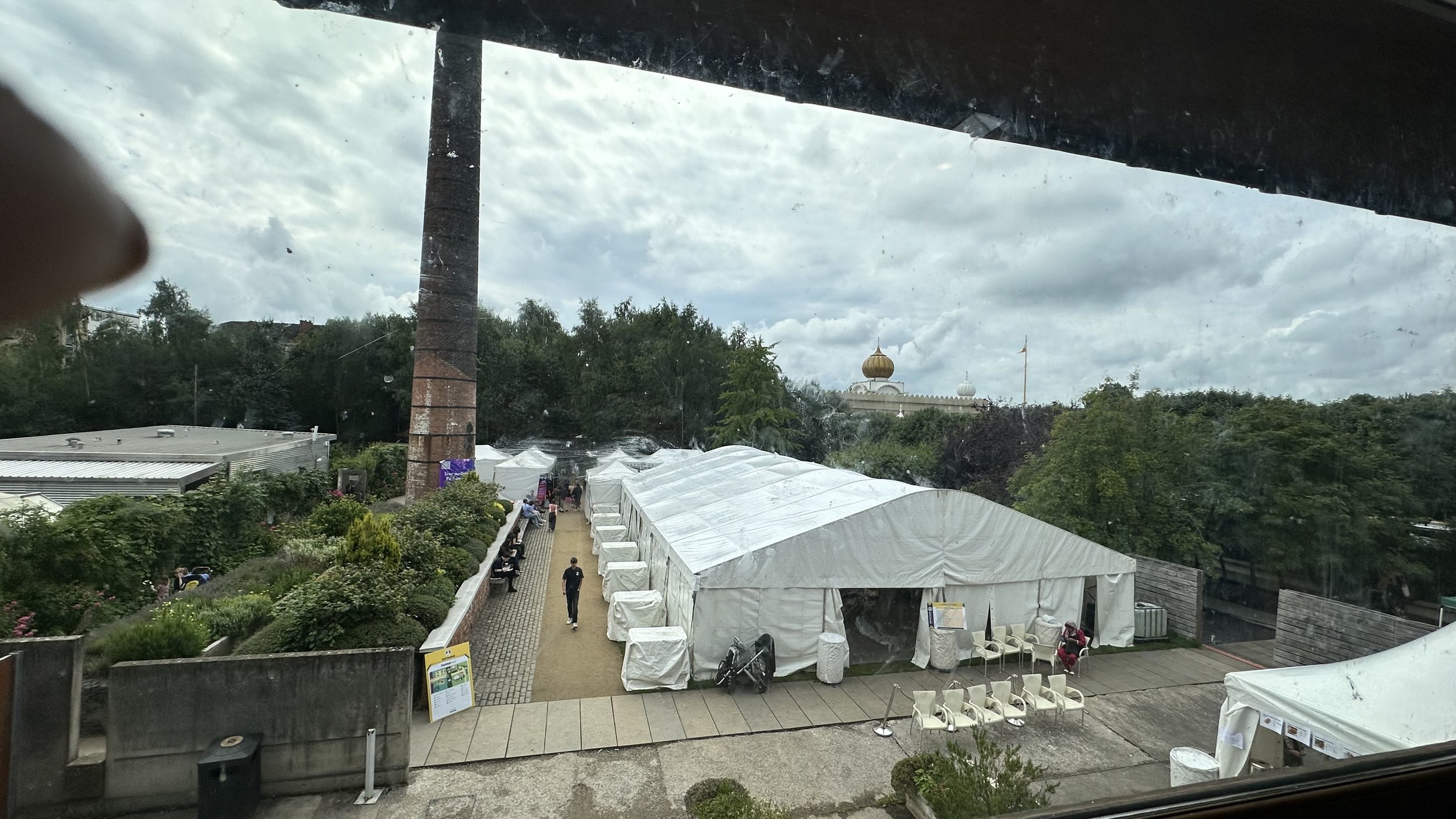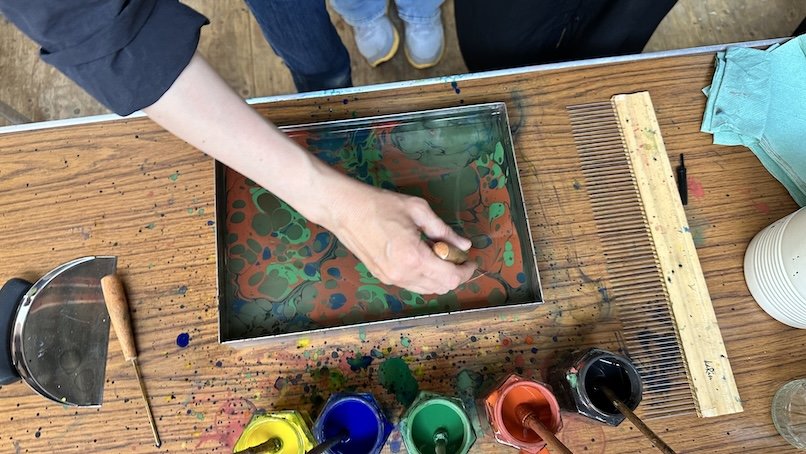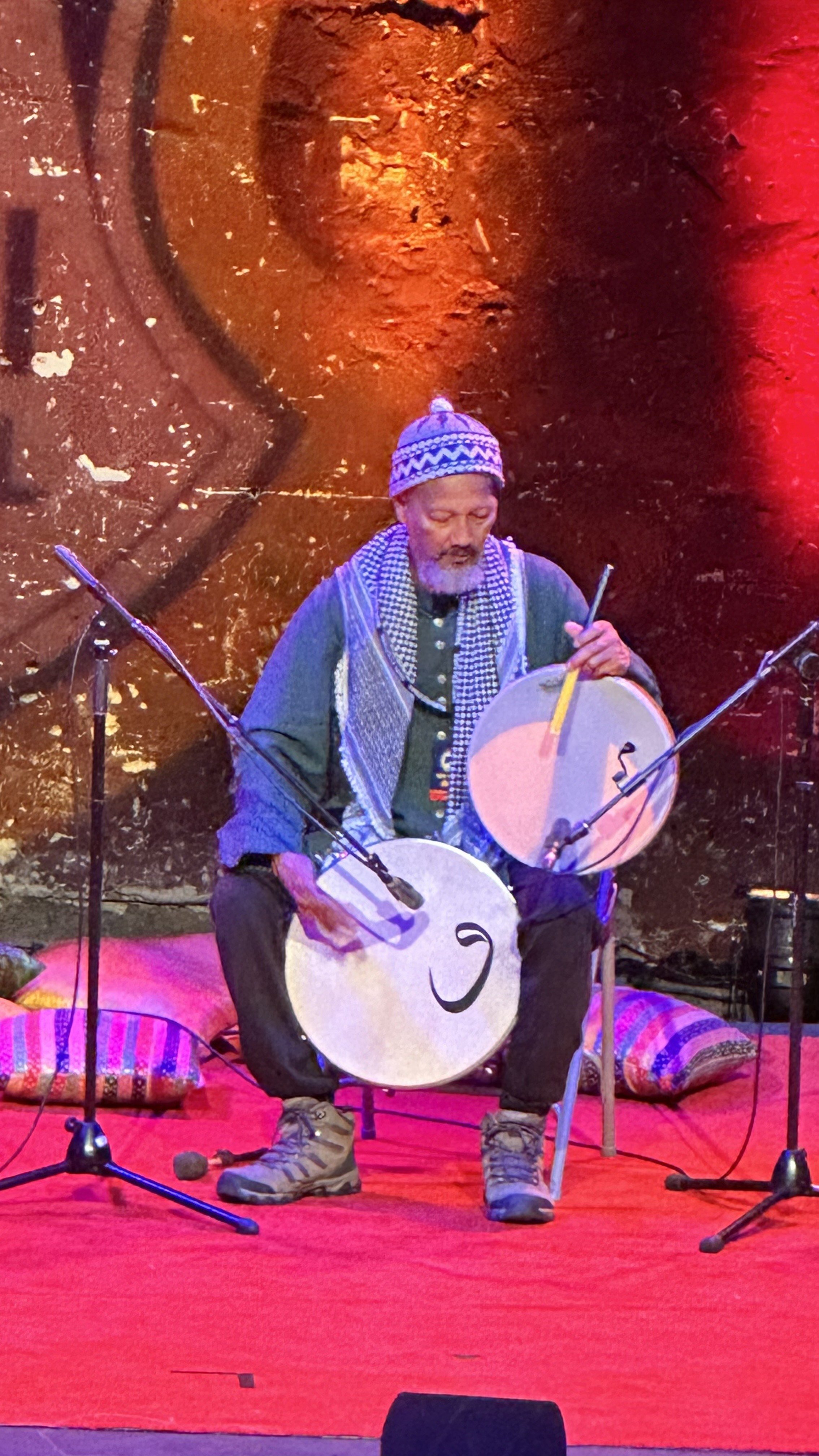Faith, poetry and whirling dervishes draw crowds to the Sufi Festival
Sufi scholars and artists gathered to share wisdom, poetry and prayer at this year’s Sufi Festival. Sadia Sikandar spoke to attendees and performers and we showcase a selection of galleries from our Greater Govanhill photography team.
Whirling dervishes performing at the Sufi Festival by Laura Vroomen
By Sadia Sikandar
Sufi Festival Scotland, held every two to three years, took place over the weekend at Tramway, with two days of events back-to-back. The first day offered space to pause and reflect with a Sufi conference hosting talks by scholars ‘rarely seen in Glasgow’, and the second day full of music, art, storytelling and performances celebrating Sufism.
Sufism, a mystic dimension of Islam, is a belief and practice in which Muslims seek to find the truth of divine love and knowledge through unification with God or Allah.
Over two days I attended some of the festivities and spoke with festival organisers, participants and attendees.
Gallery by Sadia Sikandar
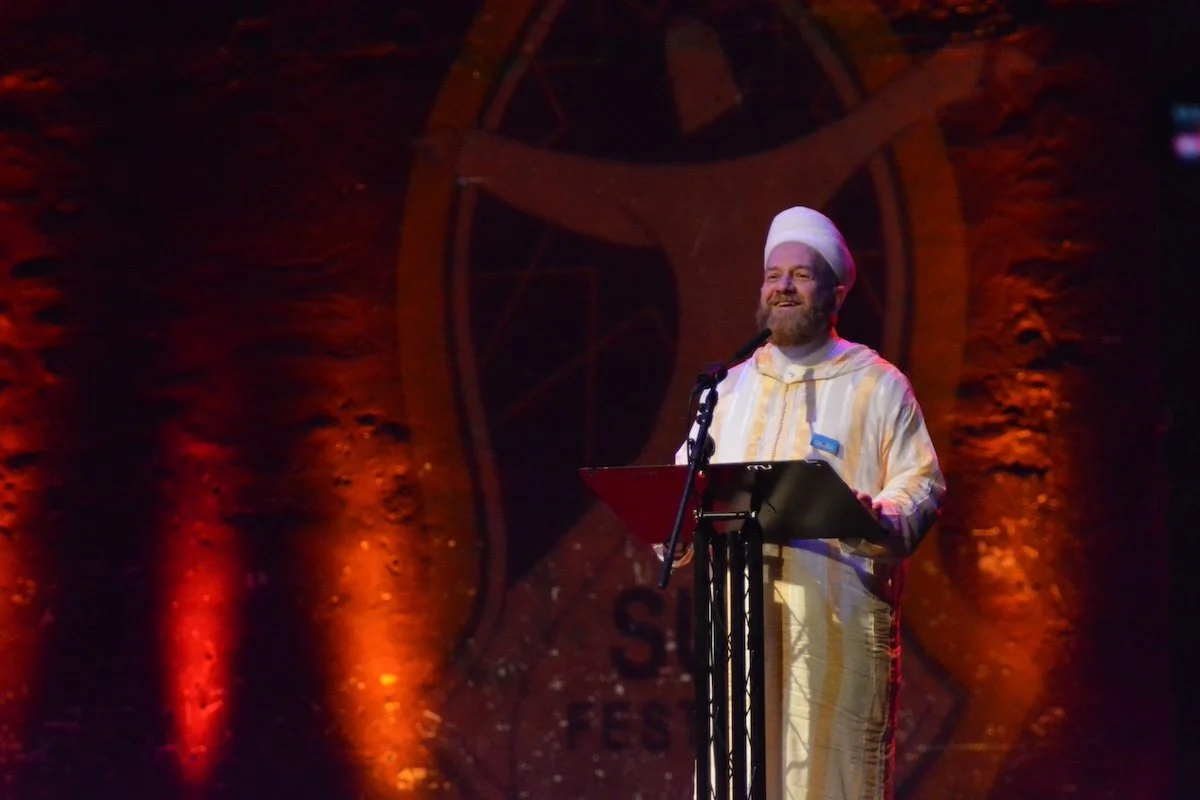

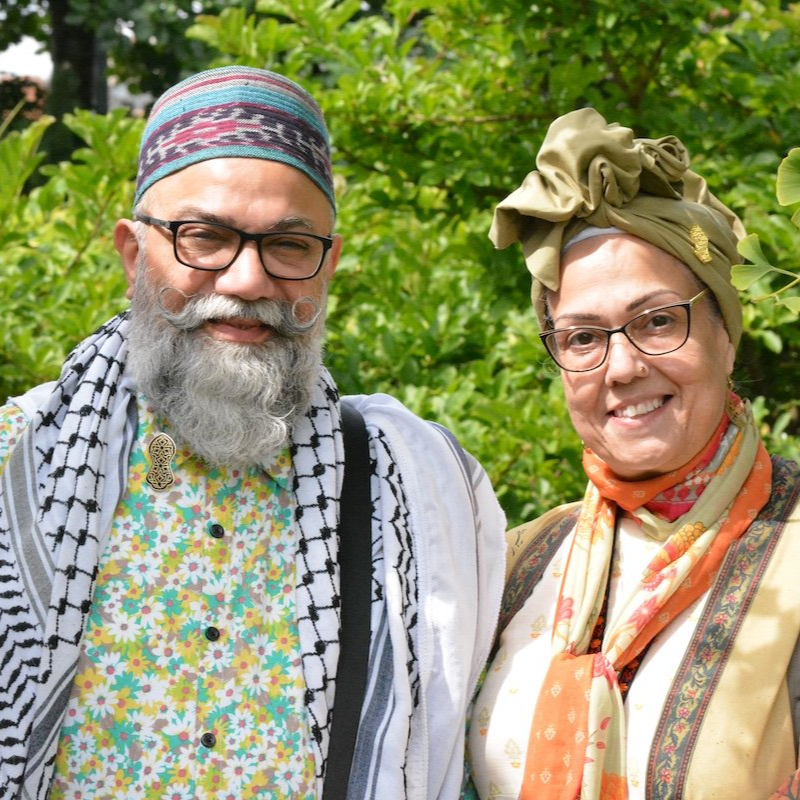
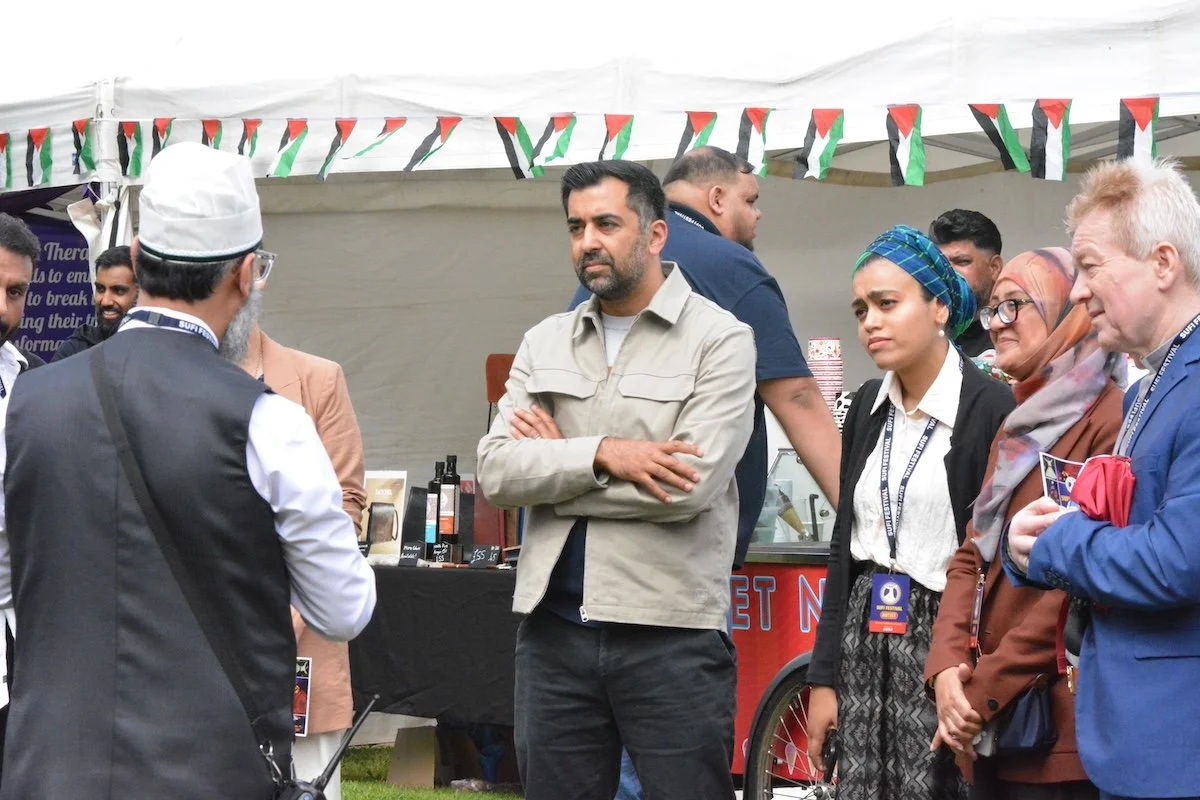




Day 1 – Bringing communities together
On the first day of the festival I had a chance to speak with the Festival Director, Tariq Mahmood.
“Our objective was really to formulate a festival that celebrated Islamic spirituality and really give everybody an experience of Islam, which often many people don't get the opportunity to experience – especially between Muslims and non-Muslims or people from different faiths.” he said.
But Sufi Festival organisers had a number of "fundamental aims” in mind, Tariq tells me:
“One primary aim – which is quite pertinent given the current context and… general context of how things are – we want to really bring communities together to break down barriers.
“As you know yourself from last year, we had these racially charged riots across the country. It happened, this time in the 21st century, which you really think would have been something way back behind the past.
“For us as an organisation, it was a message that the work we do is more essential now than it has ever been in the past.”
“We want to bring communities together, break down barriers, or any suspicions or issues people have…We are saying to people, come here, look, engage with us, interact with us, then you can decide whether you have a negative view or a positive view.”
To ensure the engagement of a wider audience, Tariq and his team made sure anyone could attend:
“It's open to all, we do not bring any barriers by saying ‘sorry, you can't come’…we're not selective.”
And it’s true, Tariq tells me there is a civic reception planned for Sunday, with ministers and major faith leaders invited along:
“We have a very diverse range of faith groups that are attending. Civic society has to be represented in something which is of community.”
The Sufi Festival is an authentic religious, cultural festival meaning the organisers don’t “sanitise” who and what they are:
“We don’t water it down to present it in such a way that we think…fits better with the wider community…we present the authentic spirituality of Islam…we do that simply because we want people to experience us in a very authentic habitat.”
Gallery by Laura Vroomen








Attendees also got the chance to listen to Sufi scholars like Shaykh Muhammad Al-Ninowy (Madina Institute), Sheikh Babikir (Rumi's Cave), Sukina Noor (Bristol City Poet) and Shaykha Noshin Gul (Guidance Hub), who enlightened the audience with pearls of wisdom from the Sufi Tradition.
Shaykh Muhammad Al Ninowy while speaking to the audience reminded them that religion is means to heal and restore:
“It's all about the inhaling of love and the exhaling of shukr (gratitude). And the more you can inhale love and keep it for seven, eight seconds at least, let it diffuse through the tissues and you'll be able to exhale gratitude.”
I also had a chance to speak with Sukina Noor – a poet, spoken word artist, playwright, artistic curator, writer and public speaker, who also gave a talk at this year’s festival.
Sukina tells me, with all her experience in the arts, facilitating workshops and speaking publicly at events, that this year’s Sufi Festival was particularly beautiful:
“I've been seeing it advertised online for many years. When it first started. I was like, ‘oh wow, this is amazing.’ The audience were really interested in listening, even those who are not Muslim.”
I asked her what kind of Qaseedah [a form of classical Arabic poetry] she shared with the audience. Sukina tells me she completed a master’s degree in creative writing and therapeutic purposes and so decided to “explore the Qaseedah tradition and how this could be seen as something that’s healing for the soul.”
Qaseedah’s have structure to them, with common themes, and for Sukina this was a source of inspiration:
“When you look at a Qaseedah, it has a very specific structure that takes you on a journey from separation to a place of presence…[and] in a Qaseedah you have three themes. One is a theme of separation, the other explores themes of journey or evolution, and there is the common theme of presence or union.”
From Sukina’s perspective, the journey of a Qaseedah, is much like the journey of the soul in Islam. “We’re always on this journey towards Allah” she says. Similarly, Sukina believes expressing her faith through poetry brings her closer to it, strengthens it.
“My overall hope is…that it encourages them [the audience] to write poetry.” she adds, “I hope that it inspires other people like me to think ‘actually this is my story as well.’”
The day also included a Q&A with audience participation, and closed with a timeless Sema performance – a form of active prayer and meditation in motion. Practitioners are known as ‘whirling dervishes’, spinning and twirling to connect with the divine.
Gallery by Rob Reid


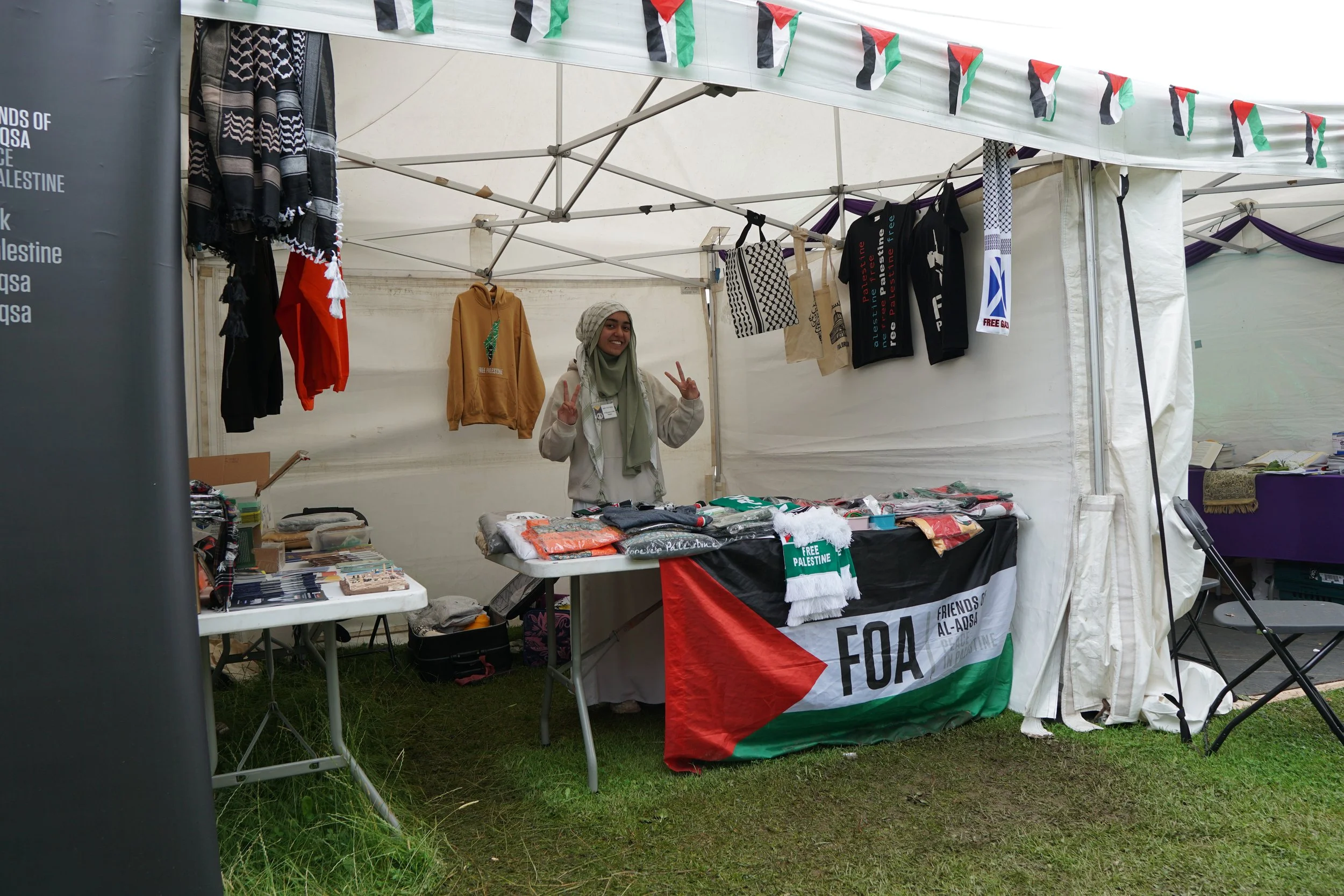





Day 2 – Diversifying the arts
On Sunday, the second day of the festival, I saw prominent politicians like Alison Thewliss and Humza Yousaf.
The former first minister spoke about on diversity and inclusion in the Scottish arts scene, reflecting the broader importance of the Sufi Festival:
"It's really important that those supporters [Scottish Government and Creative Scotland] continue to invest in festivals like the Sufi Festival. You see people of all religions, all backgrounds and nationalities coming together to enjoy community. That's what the Sufi Festival is about.
“I do think in the arts and culture in Scotland, there's always more we can do to make sure that that sector is more diversely represented. And the Sufi Festival is part of that diverse representation of our arts, our culture and our creative scene here, not just in Glasgow, but Scotland more broadly.”
By Sunday I had already seen a wide range of speakers, but this time there were more singers, art workshops, and different stage performances – accompanied by a couple of food and fashion stalls, including handmade garments.
One stall really caught my eye. The owner, Zayd Mahmood, tells me his brand is called Guardian Garms – and this was their first time selling hoodies. His group of friends, mostly young men, helped him grow the business as volunteers:
“Guardian Garms was born from a moment of reflection while I was working at the checkout in a clothing store. I found myself asking, ‘Is this really what I'm meant to do for the rest of my life?’ That question became the catalyst for change. It inspired me to dream bigger, push beyond my comfort zone, and take the leap into building something of my own – a brand that represents ambition, purpose and self belief.”
Zayd’s journey is truly inspiring – what better place to start selling clothes representative of owning your journey and identity than Sufi Festival, especially on the final day, with a bustling and energetic vibe as people poured in to see the amazing art performances, dances and shows.
It was also good to see that on both days, several stalls were set up to raise funds for Gaza. Members of the public contributed generously throughout the event.
As Sunday evening drew to a close, Tramway was graced with the rhythmic whirls of dancers and Qawwali (Sufi Islamic devotional music), with the emotionally charged notes of traditional instruments, and the deep, spiritual resonance of poetry echoing through the space.
This year’s Sufi Festival was more than a cultural gathering, it was an expression of unity, joy, community and spiritual connection that brought together people of all faiths and backgrounds together for a weekend of thought-provoking talks, meditations and spectacular, moving performances.
After attending the festival over the two days, my heartfelt thanks goes to the dedicated organisers and selfless volunteers whose hard work and hospitality made this memorable celebration possible.
In a world so often divided, Sufi Festival Scotland 2025 was a powerful reminder that the universal languages of love, music and collective joy can bring communities closer.
Gallery by Syeda Sadaf Anwar
